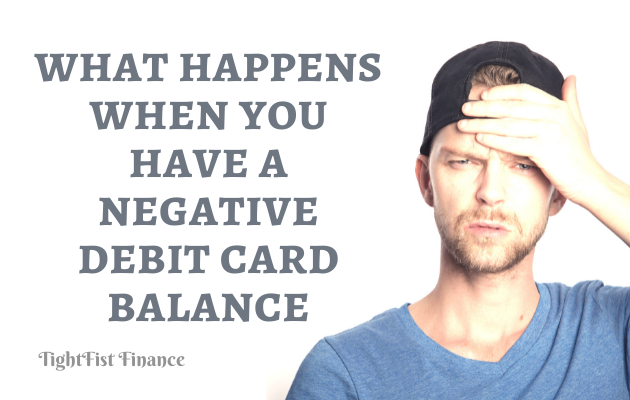What happens when you have a negative debit card balance?
Banks take action on negative account balances depending on how long the account has been in the negative. In most cases, you will be charged for causing an overdraft. If you let the negative balance last too long, you may face account closure or debt collectors.
Got a negative debit card balance? Wondering if this is going to have a massive impact on your financial life?
On this page, we will go into depth on the various things that can happen should you have a negative balance in your account. We will go through them in order of severity. Most banks will follow roughly the same process to recover their cash.

This article may contain affiliate links which pay a commission and support this blog. Thank you for your support!
Extra Charges On Your Account
Unarranged overdrafts, meaning you didn’t have permission to overdraw your account, can result in overdraft fees. Overdraft fees can range anywhere from $15 to $40, depending on your bank’s policies. To fix an overdraft fee, pay your bank and add enough money to meet the account minimums.
In most cases, your bank doesn’t allow you to overdraft your account. However, some banks still allow overdrafts. Read your cardholder agreement to determine if overdraft fees are applicable to you.
With some banks, you may not be charged fees right away. Instead, the charges will happen at the end of the month. Be prepared or you may be dealing with yet another unarranged overdraft, meaning more fees.
Some banks will have arranged overdrafts. Arranged overdrafts are when you get permission from your bank to withdraw more money than you owe. Typically, there are no fees for arranged overdrafts.
Reporting To The Credit Bureaus
While the charges are bad, they can easily be dealt with. Pay them back, and you should be fine. Leave your account negative for more than a month or two? This is when your bank will pick up the pace when it comes to dishing out punishment.
Firstly, they will report you to the credit bureaus. This means that your credit score is going to take a hit. If your credit score takes a hit, you will now be finding it more difficult to borrow money.
Remember, when your credit score suffers a hit, you will be dealing with the consequences for years. Even the slightest negative balance could prevent you from making financial purchases, such as a home.
Closure Of Your Checking Account
By this point, your account will be effectively closed. If there is no cash in your account, the bank will not honor any payments. However, as long as you add cashback to your account, you will be able to start to use it again. If you leave it in the negative? You may end up with full account closure.
If you end up dealing with a full account closure, you won’t be able to pay the money back into the account. You have no bank account. This can make it difficult to pay for things in the future.
It isn’t easy to go and open up a new bank account either. Other banks will be aware of your account closure. There aren’t that many banks out there that will willingly open up accounts for somebody that has a history of their bank account being closed!
If you do open up a new checking account somewhere, you will likely need to set up new automatic payments with all companies you give cash to. You will have to talk to your workplace about paying cash into the new account. It is a ton of hassle.
Debt Collectors
Account closed? That doesn’t eliminate your debt. That is still due. Your bank will be pretty unhappy with you by this point and may decide to pursue collections.
Your bank may send one final demand for payment and tell you when the cash needs to be sent to them. Since you have no checking account, you will likely need to send this cash like you would pay any other bill. The bank will give you the account details.
Still not paid? Well, now the debt collectors are going to get involved. You are going to get more charges. You will be dealing with even bigger issues on your credit report.
How Do You Deal With a Negative Debit Card Balance?
Your best option is to pay your balance. As long as you can get your bank account up to your minimum account balance, then you should be fine. Banks are only concerned when you owe them money.
Reach out to the bank if you can’t get the account back in good standing. Most banks are willing to work with you if this is your first time dealing with a negative balance. They may be able to give you a payment plan or at least delay account closures, debt collection, etc.
If this is your first time going into the negative, you may find that the bank will eliminate any charges. This can make it a little bit easier to restore your account balance.
Moving forward, try to do as much as possible to ensure that your account doesn’t go into the negative again. This means budgeting or maybe preventing automatic payments to avoid accidental overdrafts.
Conclusion
Having a negative debit card balance is never a good thing. You have to deal with charges for having a negative balance, but you will also have to deal with the potential loss of your account, credit report issues, and even debt collectors.
If your debit card ever shows a negative balance, then you must do your best to ensure that you get that account back into the positive as quickly as possible. Talk to your bank if you need help.
Recommended
Based on this article, we think you’ll enjoy the following: